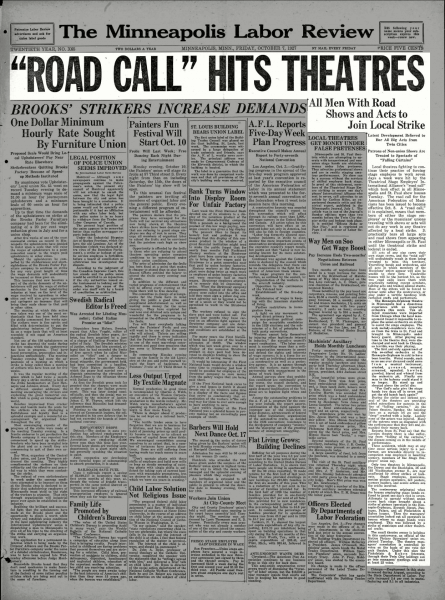| Artifact Type | Labor Newspapers, Sources |
| Publication | Minneapolis Labor Review |
| Number | X65 |
| Page Number | 1 |
| Place | Minneapolis, MN |
| Publication Date | October 10, 1927 |
| Transcript | Show/Hide |
|
Headline: ““Road Call” Hits Theatres” Subhead: All Men With Road Shows and Acts to Join Local Strike Latest Development Believed to Bar All Big Acts from Twin CitiesPatrons of Non-union Shows are Treated to Spectacle of “Falling Curtains”Local theatres fighting to continue their practice of forcing stage employes to work seven days a week were hit by the Theatrical Stage Employes’ International Alliance’s “road call” which took effect in all Minneapolis and St. Paul show houses Tuesday. The road call for the American Federation of Musicians has been issued to become effective Oct. 8. A “road call,” it is explained, means that members of either the stage employes’ or the musicians’ unions traveling with shows or acts will not do any work in any theatre affected by a local strike. It practically bars all large acts and road shows from app earing in either Minneapolis or St. Paul until the theatrical strike and lockout is ended. All acts of any size carry their own stagc crews, and the “road call” will undoubtedly result in them being rerouted to miss this territory. Travelling bands and orchestra s, and all nets in whkh members of the musicians’ union appear will also be unable to show here. Vaudeville houses will be the hard est hit, as the two road calls lea\’o them with practically nothing except acrobats, talking acts and trained animal stunts. Most of the others will be forced to detour until after the controversy, or play under a terrific handicap with curtailed staffs and performers. The Hennepin–Orpheum theatre in Minneapolis had a disastrous experience with an iniported orchestra this week. Ten alleged musicians were imported from Chicago when the local mnnagcment found it impossible to re. place the union orchestra on strike to assist the singe employes . The scab melody-murderers were taken from the train in St. Paul and hrought to Minneapolis under heavy guard. After playing one tune in the theatre they were discharged and sent back to Chicago, so terrible was their playing. The first and only appearance of this so-called orchestra at the Hcnnepin-Orphcum is said to have been horrific. Weird sounds, such as no one ever dreamed could come fro n1 a musical instrument, crashed, groaned, moaned, screamed, squealed, howled, growled, blared and whined from the orchestra pit. Finally one man in the balcony could stand it no longer . He stood up and shouted above the awful din: “For God’s sake give the stage hands two days of in seven and get the old bunch back again!” During the strike and lockout severa l of the theaters arc providing addcd attractions (or patrons in the line of “falling curtains.” At the Palace theatre, Sunday, the hoisting lines on a curtain let go and the “drop” crashcd with a bang. Luckily none of the actors was injured. Many of the patron s were so disgusted with the performance that they left and demanded their money back. Reports from St. Paul say that the Lyceum theatre there is also suffering from “falling of the curtains:” the disease coming on in the middle of a performance. These accidents, which may at any time cause serious injury to a performer, are traceable directly to incompetent men employed in handling scenery, members of the Stage Employes’ union say. Only two theatres in Minneapolis, the Dewey and the Stockholm, 38 and 103 Washington avenue S. are now unaffected by either strikes or lockouts . Stage employes , musicians, motion picture operators, bill posters, scenery haulers, and scenic artists are the crafts involved. The controversy originated when the houses employing stage hands refused to ‘grant one day’s rest in seven. Attcmpts to operate without union crews back smgc brought about a strike of picture operators in the Hennepin–Orpheum, Seventh Street, Pantages, Palace, and all Finkelstein & Ruben houses. Then the manngers’ association locked out all operators in houses where no stage hands were employed. This was followed by a strike of musicians and other theatrical crafts. The small theatre owner is helpless in this controversy, an official of the Motion Picture Operators’ union explained Tuesday. The theatre managers’ association is controlled by votes on the basis of · one vote for each theatre. Under this plan the Finkelstein & Ruben interests, through their Twin City holdings can go into managers’ meetings and cast at least 23 votes. |
|
| Archive | Labor Review Archive Project |
| Read In Context | http://www.minneapolisunions.org/labor_review_archive_about.php |
| Citation | ““Road Call” Hits Theatres,” Minneapolis Labor Review, October 10, 1927. |
| Location | MinneapolisMinnesotaSaint Paul |
| Tags | 1920s1927 |
